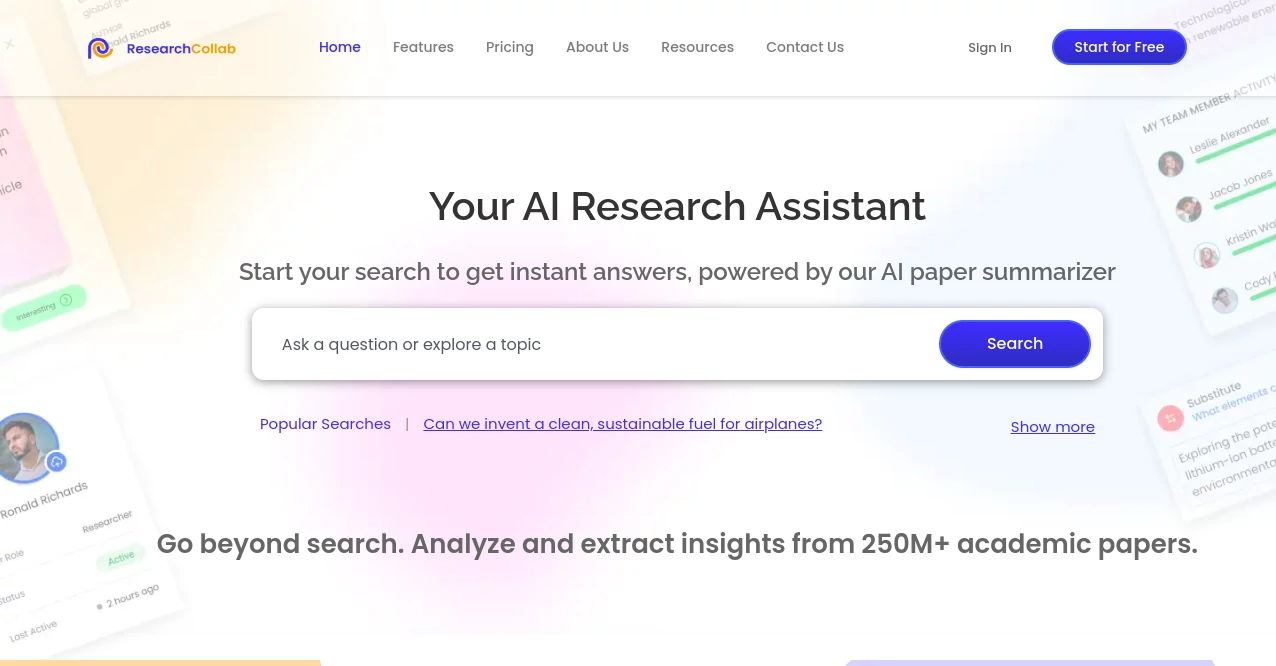🧠 AI Quiz
Think you really understand Artificial Intelligence?
Test yourself and see how well you know the world of AI.
Answer AI-related questions, compete with other users, and prove that
you’re among the best when it comes to AI knowledge.
Reach the top of our leaderboard.
ResearchCollab ai
Your AI Research Assistant

What is ResearchCollab ai?
Researchcollab steps in like a tireless lab partner, sifting through mountains of papers so you can spot the gold nuggets faster. It pulls answers from over 250 million academic works, then hands you neat tags, outlines, and citations without breaking a sweat. Students and profs who’ve tried it say goodbye to late-night scrolling and hello to clearer milestones.
Introduction
Researchcollab launched quietly but caught fire among grad students drowning in PDFs. The team built it to “go beyond search,” turning raw queries into instant summaries and fresh angles. Within months, labs started swapping sticky notes for shared boards inside the app. Today it’s the quiet engine behind theses, grant drafts, and journal clubs, proving that a smart sidekick can shave weeks off any project timeline.
Key Features
User Interface
Drop a question in the search bar and watch papers line up like cards on a table. Drag any card to a custom tag—think “Must-Read” or “Maybe-Later”—and the board reshuffles itself. A side panel slides out for outlines or citations with one click, keeping your screen calm even when the library feels chaotic.
Accuracy & Performance
Summaries stick close to the original text, pulling direct quotes when needed so you never chase a ghost reference. Background scans finish before your coffee cools, and citation styles flip perfectly between APA and MLA without a hiccup. Users clock real gains—cutting literature hunts from days to hours.
Capabilities
It reads uploaded PDFs, tags them automatically, then spins brainstorming prompts that spark new angles. One tap builds a full outline; another exports flawless citations. Team folders let co-authors drop comments or new finds, while progress rings show exactly how close you are to submission day.
Security & Privacy
Your uploads stay locked to your account, visible only to teammates you invite. No public indexing means your unpublished drafts never leak, and the free trial asks for zero payment details upfront, keeping early experiments worry-free.
Use Cases
Master’s candidates dump a semester’s reading list, get auto-tags, and walk away with a color-coded roadmap. Post-docs brainstorm grant twists by asking “what if” questions that surface overlooked papers. Journal clubs share a single board where everyone drops highlights, turning hour-long debates into focused fifteen-minute wins.
Pros and Cons
Pros:
- Turns a folder of PDFs into a tidy, searchable vault in minutes.
- Citation generator saves the panic of formatting at 2 a.m.
- Team boards keep remote labs on the same page.
- Free trial gives full power, no card required.
Cons:
- Heavy PDF batches can slow mobile browsers.
- Outline suggestions lean academic—creative writers may tweak more.
- No offline mode yet for plane rides.
Pricing Plans
Jump in with a full-featured free trial that never expires for light use. Upgrade later to unlimited storage and priority scans for a modest monthly fee—exact digits appear after you fall in love during the trial. Cancel any time; no hard feelings.
How to Use Researchcollab
Sign up with email, drag your first five papers in, and type a burning question. Watch tags appear, then click “Build Outline” for a ready skeleton. Share the board link with your super-visor, export citations, and tick off milestones as you go. Ten minutes in, you’ll wonder how you ever lived without it.
Comparison with Similar Tools
Where generic readers just highlight, Researchcollab tags and tracks progress like a project manager. Against paid suites, it delivers the same citation magic at friendlier entry cost. It’s the sweet spot for academics who want brains and boards without the bloat.
Conclusion
Researchcollab doesn’t just store papers—it breathes life into them, turning solitary slog into shared discovery. Slip it into your workflow and watch deadlines shrink while insights grow. For anyone wrestling a bibliography, this is the lab mate you always wished walked through the door.
Frequently Asked Questions (FAQ)
Which citation styles are supported?
APA, MLA, Chicago, and Harvard—switch with a single click.
Can I upload my own PDFs?
Yes, drag and drop any batch; they’re scanned and tagged instantly.
Is my unpublished work safe?
Private by default—only invited teammates see inside.
Does the free trial ever expire?
Core features stay free forever; upgrade only for heavier loads.
Works on phone?
Mobile web is smooth for quick checks, full desktop for deep dives.
AI Research Tool , AI Knowledge Base , AI Productivity Tools , AI Documents Assistant .
These classifications represent its core capabilities and areas of application. For related tools, explore the linked categories above.
ResearchCollab ai details
This tool is no longer available on submitaitools.org; find alternatives on Alternative to ResearchCollab ai.
Pricing
- Free
Apps
- Web Tools
Categories
ResearchCollab ai Alternatives Product
Toonifyit
Watermark in…
Prelight
photo to URL
Lexikon AI
Hirescope.te…
Linkflare
SlideStorm AI


















